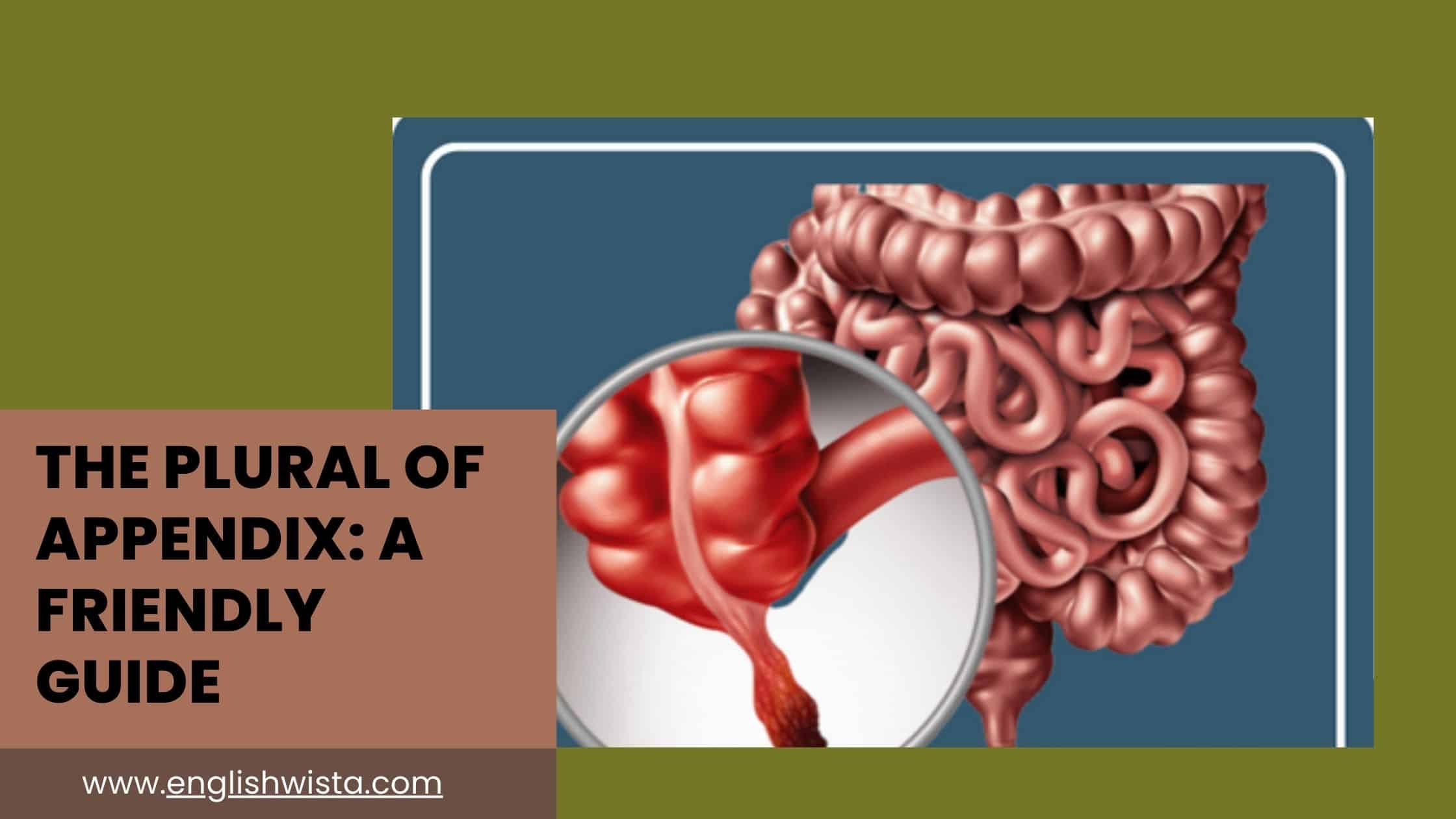Have you ever been reading a book or a scientific paper and noticed the word “appendix” at the end? Then, later, you see someone write “appendices” and wonder, “Wait… is that the same thing? Which one is right?”
Don’t worry you’re not alone. The word appendix can be a little confusing because it doesn’t form its plural in the usual “just add -s” way. Many people pause when they need to write or say its plural, especially since it looks a bit unusual compared to most English words.
In this article, we’re going to break it all down step by step. We’ll look at what appendix means, how to make it plural, why there’s sometimes more than one correct answer, and plenty of real-life examples so you’ll feel confident using it. By the end, you’ll be an expert who can spot and use the plural form without hesitation.
So, grab a cup of tea, relax, and let’s explore the world of appendix!
What Does “Appendix” Mean?
Before we get to plurals, let’s make sure we know what the word itself means.
The word appendix can have two main uses in English:
- In books, papers, or documents
- An appendix is an extra section added at the end of the main text.
- It usually includes details, tables, references, or explanations that would clutter the main content if they were included in the body.
- “The full data set can be found in the appendix.”
- In anatomy (the human body)
- The appendix is a small, tube-shaped organ attached to the large intestine.
- Many people have heard of it because of appendicitis, a painful condition that sometimes requires surgery.
- “The doctor said my appendix needed to be removed.”
So, depending on the context, appendix could be something you read in a book or something you carry inside your body.
What Is the Plural of Appendix?
Here’s the key answer you’re looking for:
The plural of appendix can be appendices or appendixes.
Yes, both are correct! But here’s how they’re usually used:
- Appendices → the more common form when talking about books, papers, and documents.
- Appendixes → the more common form when talking about the body part.
So, if you’re writing a research paper and you have three separate sections at the end, you would say:
- “The report includes three appendices.”
But if a doctor is talking about several patients with inflamed body parts, they might say:
- “The surgeons removed five appendixes this week.”
Both plurals exist, but the usage often depends on context.
Why Does Appendix Have Two Plurals?
This is where English gets fun (and a little tricky).
The word appendix comes from Latin. In Latin, words ending in -ix often make their plural by changing to -ices. That’s why we get appendices.
Examples of similar words:
- index → indices
- matrix → matrices
However, over time, English has become more flexible. Instead of always following Latin rules, we sometimes just add -es to make it easier. That’s how we also got appendixes.
So today, English speakers accept both:
- The “traditional” Latin plural: appendices.
- The “modernized” English plural: appendixes.
Is Appendix Singular or Plural?
This might sound simple, but let’s clear it up because it’s a common point of confusion.
- Appendix = singular (just one).
- Appendices / Appendixes = plural (more than one).
Think of it like this:
- One appendix = one item (in a book) or one organ (in your body).
- Two or more appendices/appendixes = multiple items or organs.
Example sentences:
- “The appendix at the back of the book explains the technical terms.”
- “There are three appendices attached to this research paper.”
- “The human body normally has one appendix, but in rare cases, some people are born with two appendixes.”
Which Plural Should You Use?
This is the part most people really want to know: which one should you use?
Here’s a simple rule of thumb:
- Use appendices when talking about books, documents, and written materials.
- Use appendixes when talking about the organ in the body.
Of course, if you use the “wrong” one, most people will still understand you. But choosing the more common form in each context will make your writing look polished and correct.
Real-Life Examples of Appendix and Its Plurals
Let’s practice with some everyday examples.
In Books and Documents
- “The author added two appendices at the end to provide extra charts.”
- “This report has an appendix that explains the survey method.”
- “Please see Appendices A and B for additional references.”
In the Human Body
- “His appendix was removed last year.”
- “Doctors studied the appendixes of several patients to understand the condition.”
- “In rare medical cases, a person may have multiple appendixes.”
Notice how in medical or anatomical contexts, “appendixes” sounds more natural, while in academic or publishing contexts, “appendices” is the preferred choice.
How Do You Pronounce Appendices and Appendixes?
Good question! Let’s break it down.
- Appendix → uh-PEN-diks
- Appendices → uh-PEN-dih-seez
- Appendixes → uh-PEN-diks-iz
Tip: When you’re speaking, it can help to say it slowly the first few times until it feels natural.
Quick Comparison with Similar Words
To make this clearer, let’s look at other words that act like appendix:
- Index → indices / indexes
- In books: “See the indices for more details.”
- In everyday talk: “Stock market indexes rose today.”
- Matrix → matrices / matrixes
- In math/science: “The matrices were calculated.”
- In casual use: “We explored different matrixes of ideas.”
So, appendix follows the same pattern: a traditional Latin-style plural (appendices) and a simpler English-style plural (appendixes).
Fun Facts About Appendix
Let’s add a few interesting bits you might enjoy:
- The Human Appendix Isn’t Useless
For many years, people thought the appendix had no function. But scientists now believe it may play a role in gut health and supporting the immune system. - Some People Have Two Appendixes
It’s rare, but a small number of people are born with more than one appendix. - Appendices in Books Can Be Very Useful
In academic writing, appendices often contain tables, charts, survey questions, or detailed explanations that would make the main text too long or confusing. - Latin Roots
The word appendix comes from the Latin word appendere, which means “to hang upon” or “something added.” That makes sense it’s something attached to the main part, whether it’s a body organ or an extra section of a book.
Common Mistakes to Avoid
When learning the plural of appendix, people sometimes make these mistakes:
- ❌ Saying “appendixes” in a formal paper instead of “appendices.”
- ❌ Thinking “appendices” only refers to body parts (it’s actually the opposite).
- ❌ Forgetting that appendix is singular and using it to mean more than one.
To avoid these errors, just remember:
- Books → appendices.
- Bodies → appendixes.
Quick Recap
We’ve covered a lot, so let’s do a quick review:
- Appendix means either a section at the end of a book or the small organ in the body.
- The plural can be appendices (Latin-style) or appendixes (English-style).
- Use appendices for books and documents.
- Use appendixes for the body organ.
- Both are correct, but context matters.
Conclusion
So, what’s the plural of appendix? Easy it can be either appendices or appendixes, depending on what you’re talking about.
If you’re flipping through a textbook or writing a report, you’ll probably use appendices. If you’re chatting with a doctor or reading about biology, you’ll most likely see appendixes.
The best part is, now you know the difference, and you can confidently use the right form in the right place. No more second-guessing or awkward pauses when you need the plural.
So next time you see the word appendix, you’ll know exactly how to handle it whether it’s in a book or in the human body.



